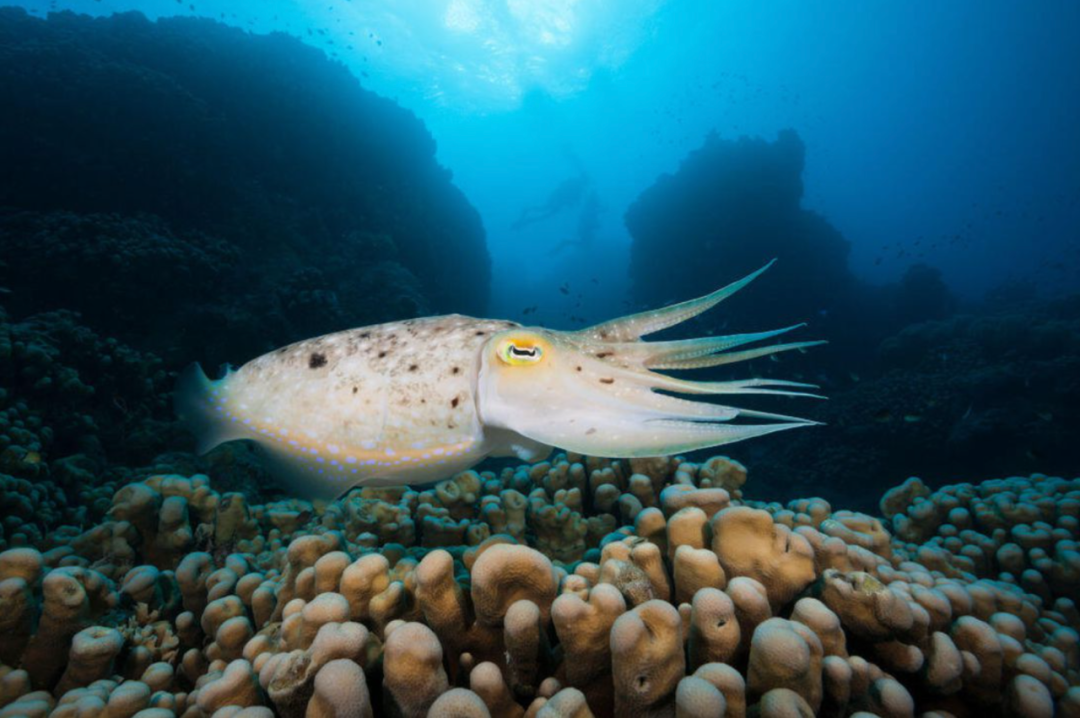在“棉花糖测试”中乌贼表现的和孩子一样聪明
The marine mollusks demonstrate they're able to delay gratification for the reward of a better snack.
海洋软体动物证明它们能够延迟满足感,以获得更好的食物。

Reinhard Dirscherl/Getty Images
Treats can be hard to resist, no matter what your age or species. But a new study reveals that cuttlefish -- yes, the marine mollusk -- can adapt to a well-known psychological test given to human children, and learn to defer gratification in order to snag a better snack.
无论你的年龄和种族如何,你都很难抗拒美食的诱惑。但一项新的研究表明,乌贼,这种海洋软体动物能够适应一项著名的针对人类儿童的心理测试,并学会推迟满足感以获得更好的食物。
Known to some as the Stanford Marshmallow Test, the original test was a study on delayed gratification led by psychologist and professor Walter Mischel, who began it in 1970 and published his results in 1972. Participating children were offered a pretzel stick or marshmallow but told if they could wait for the treat, they'd receive two of the item. Follow-up studies examined whether the children who could successfully wait ended up with better life outcomes.
最初的这个测试被一些人称为“斯坦福棉花糖测试”,是由心理学家沃尔特•米歇尔教授领导的一项关于延迟满足的研究。他从1970年开始进行这个测试,并在1972年公布了他的结果。参与实验的孩子们可以立即得到了一根椒盐卷饼棒或一块棉花糖奖励,或者选择等待一段时间,得到相同的两样奖励。后续研究考察了那些能够成功等待的孩子是否会有更好的生活。
Cuttlefish in the present study were all able to wait for the better reward and tolerated delays for up to 50-130 seconds, which is comparable to what we see in large-brained vertebrates such as chimpanzees, crows and parrots, said lead author Alexandra Schnell of the University of Cambridge in England.
“在目前的研究中,乌贼都能够等待更好的奖励,并且能够忍受长达50-130秒的延迟,这与我们在黑猩猩、乌鸦和鹦鹉等脑部较大的脊椎动物身上看到的情况相当,”英国剑桥大学的亚历山德拉·施内尔说。
Cuttlefish, of course, can't simply be offered the verbal choice of two different snacks. In the study, they were shown two different food options behind clear walls. One showed raw king prawn, and the other their preferred food of live grass shrimp. The cuttlefish were trained that certain symbols on the chamber doors meant the door would either open right away, open after a delay, or not open at all.
当然,不能简单地给乌贼提供两种不同食物的口头选择。在这项研究中,它们可以看见在透明墙壁后面的两种不同的食物选择。一组展示的是大虾,而另一组则是它们喜欢的活草虾。乌贼被训练学会识别不同的符号,房间门上的某些符号意味着门要么马上打开,要么在一段时间后打开,或者根本就不打开。
The prawn door opened right away, but if the cuttlefish ate it, the shrimp option was taken away. If the prawn door opened and the cuttlefish left it alone, they eventually were given a chance at the shrimp.
大虾的门会立即打开,但如果乌贼吃了,草虾的选项就被取消了。如果大虾的门打开,乌贼不去打扰大虾,它们最终就有机会吃掉活草虾。
The scientists don't know why the cuttlefish developed such self-control, but they theorize it might be related to the fact that they're vulnerable to ocean predators, so it benefits them to stay hidden until the good chow shows up.
科学家们不知道为什么乌贼会有这样的自我控制能力,但他们推测这可能与它们易受海洋掠食者攻击的事实有关,所以在好的食物出现之前保持隐藏对它们是有好处的。
Cuttlefish spend most of their time camouflaging, sitting and waiting, punctuated by brief periods of foraging, Schnell said in a statement. They break camouflage when they forage, so they are exposed to every predator in the ocean that wants to eat them. We speculate that delayed gratification may have evolved as a byproduct of this, so the cuttlefish can optimize foraging by waiting to choose better quality food.
施内尔在一份声明中说:“乌贼大部分时间都在伪装,坐着等待,期间有短暂的觅食时间。当它们觅食时,它们会打破伪装,暴露在海洋中每一个想要吃掉它们的捕食者面前。我们推测,延迟满足可能是作为副产品进化而来的,所以乌贼可以通过等待选择更优质的食物来优化觅食。”
文章来源于:https://www.cnet.com/news/cuttlefish-show-theyre-as-smart-as-kids-in-marshmallow-test-study/
(责任编辑:陈卓)
(转载自:科学猫科普微信公众号)
